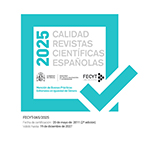Colombia in the International Arena in the Interwar Period: motives and challenges
Abstract
The inter-war period was a time when exchanges between Colombia and the rest of the world developed remarkably despite the subordination of the nation’s diplomacy to the foreign policy of the United States, its main economic partner. As a result, for the Colombian government, the struggle against imperialism constituted one of the pillars of its foreign policy, calling for the strengthening of regional cooperation and the mobilization of international expertise for the material and human development of Latin American states. Influenced by the optimism born in Versailles and by Wilsonian ideals, the various succeeding administrations during this period sought to characterize regional realities and strengthen state institutions in favor of the materialization of a project of humanist democracy.
Downloads
Article download
License
In order to support the global exchange of knowledge, the journal Revista Complutense de Historia de América is allowing unrestricted access to its content as from its publication in this electronic edition, and as such it is an open-access journal. The originals published in this journal are the property of the Complutense University of Madrid and any reproduction thereof in full or in part must cite the source. All content is distributed under a Creative Commons Attribution 4.0 use and distribution licence (CC BY 4.0). This circumstance must be expressly stated in these terms where necessary. You can view the summary and the complete legal text of the licence.











